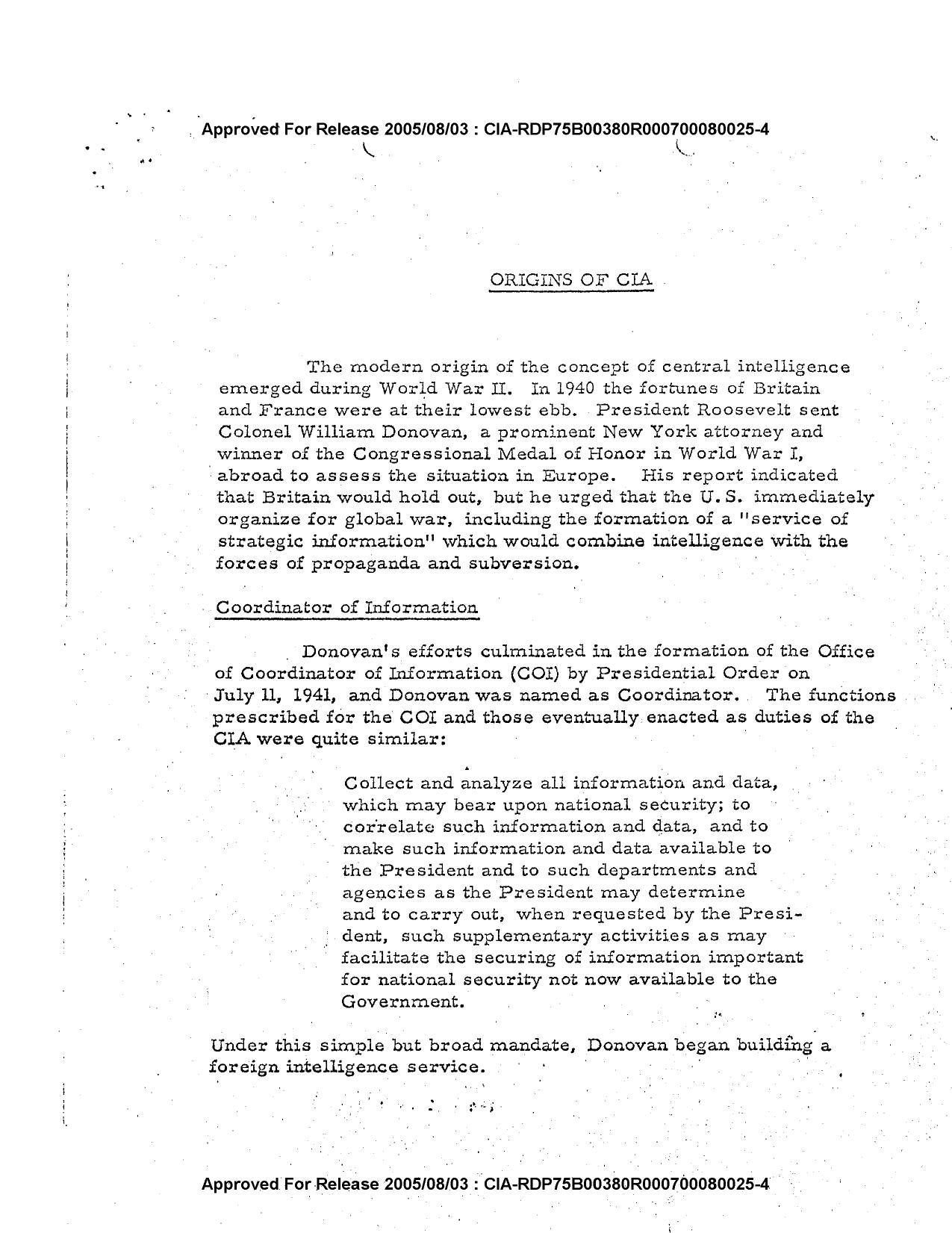
ORIGINS OF THE CIA PDF
23 Pages·2005·1.2631 MB·other
Most books are stored in the elastic cloud where traffic is expensive. For this reason, we have a limit on daily download.
Preview ORIGINS OF THE CIA
Description:
This rare report is difficult to locate. It provides details on how the CIA started and the Act that established the agency in 1949. This Act does not mention collecting information or conducting cover operations. Yet, it is still in place today.
Approved for Release 2005/08/03 : CIA-RDP75B00380R000700080025-4
The modern origin of the concept of central intelligence emerged during World War II. In 1940 the fortunes of Britain and France were at their lowest ebb. President Roosevelt sent Colonel William Donovan, a prominent New York attorney and winner of the Congressional Medal of Honor in World War I, abroad to assess the situation in Europe. His report indicated that Britain would hold out, but he urged that the U. S. immediately organize for global war, including the formation of a "service of strategic information" which would combine intelligence with the forces of propaganda and subversion. Coordinator of Information Donovan's efforts culminated in the formation of the Office of Coordinator of Information (COl) by Presidential Order on July 11, 1941, and Donovan was named as Coordinator.
Office of Strategic Services: Following the Declaration of War against the AKIS powers, it was clearly desirable to provide a closer link between tested and developing capabilities of COI and the Armed Forces. On June 13, 1942 the President, as Commander in Chief, issued a military order redesignating the COI as the Office of Strategic Services (OSS) under the jurisdiction of the Joint Chiefs. Foreign information activities of COI were transferred to the newly created Office of War Information--the predecessor of the present USLA. The charge for OSS was to: 4,,. Collect and analyze such strategic in- formation as may be required by the United States Joint Chiefs of Staff. b. 'Plan and operate such special services as may be directed by the United States Joint Chiefs of Staff. OSS was forced to adjust to a number of problems which had not faced COI.
The President extended to OSS the same privilege to enter into contracts "... without regard to the provisions of law relating to the marking, performance, amendment, or modification of con- tracts.... " as had been earlier granted to the War Department, the Navy 'Department, and the United States Maritime Commission under the" First War Powers Act of 1941. From its inception, OSS operated under two unusual rules relating to the expenditure of Government monies. One permitted latitude concerning the purpose for which funds could be expended. The other protected against the unauthorized disclosure of the purpose and details of certain expenditures.
Approved for Release 2005/08/03 : CIA-RDP75B00380R000700080025-4
The modern origin of the concept of central intelligence emerged during World War II. In 1940 the fortunes of Britain and France were at their lowest ebb. President Roosevelt sent Colonel William Donovan, a prominent New York attorney and winner of the Congressional Medal of Honor in World War I, abroad to assess the situation in Europe. His report indicated that Britain would hold out, but he urged that the U. S. immediately organize for global war, including the formation of a "service of strategic information" which would combine intelligence with the forces of propaganda and subversion. Coordinator of Information Donovan's efforts culminated in the formation of the Office of Coordinator of Information (COl) by Presidential Order on July 11, 1941, and Donovan was named as Coordinator.
Office of Strategic Services: Following the Declaration of War against the AKIS powers, it was clearly desirable to provide a closer link between tested and developing capabilities of COI and the Armed Forces. On June 13, 1942 the President, as Commander in Chief, issued a military order redesignating the COI as the Office of Strategic Services (OSS) under the jurisdiction of the Joint Chiefs. Foreign information activities of COI were transferred to the newly created Office of War Information--the predecessor of the present USLA. The charge for OSS was to: 4,,. Collect and analyze such strategic in- formation as may be required by the United States Joint Chiefs of Staff. b. 'Plan and operate such special services as may be directed by the United States Joint Chiefs of Staff. OSS was forced to adjust to a number of problems which had not faced COI.
The President extended to OSS the same privilege to enter into contracts "... without regard to the provisions of law relating to the marking, performance, amendment, or modification of con- tracts.... " as had been earlier granted to the War Department, the Navy 'Department, and the United States Maritime Commission under the" First War Powers Act of 1941. From its inception, OSS operated under two unusual rules relating to the expenditure of Government monies. One permitted latitude concerning the purpose for which funds could be expended. The other protected against the unauthorized disclosure of the purpose and details of certain expenditures.
See more
The list of books you might like
Most books are stored in the elastic cloud where traffic is expensive. For this reason, we have a limit on daily download.
